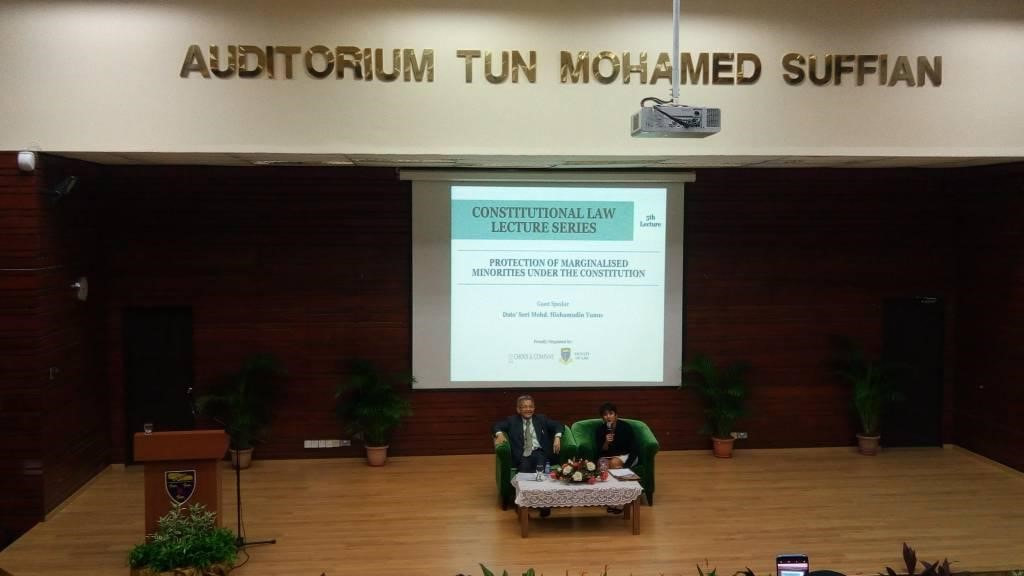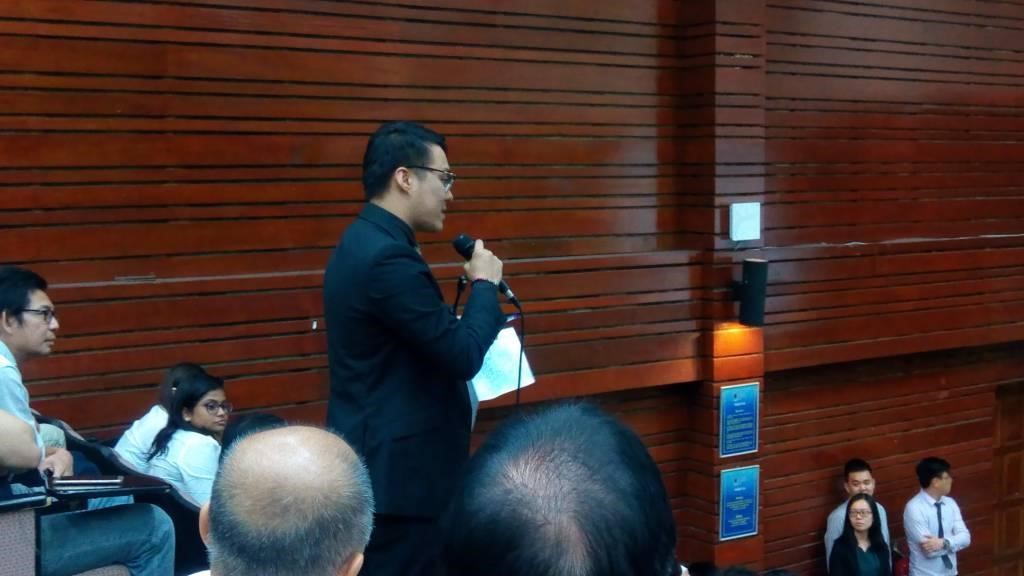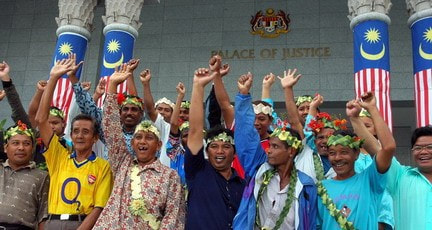|
2/10/2017 0 Comments The 5th Constitutional Law Lecture Series: Constitution and the Protection of Marginalised Minority in MalaysiaOn 28th September 2017, the 5th Constitutional Law Lecture, as part of the Constitutional Law Lecture Series, was held at the Tun Mohamed Suffian Auditorium, Faculty of Law, University of Malaya. It was an honour to have an address given by the highly-esteemed guest speaker, Dato’ Seri Mohd Hishamudin Yunus, the former Court of Appeal Judge, on the topic of ‘Constitution and the Protection of Marginalised Minority.’  The Lecture was held at Tun Mohamed Suffian Auditorium in the Faculty of Law, University of Malaya With over 100 ethnic groups, Malaysia prides herself as a melting pot for people of different races, religions, cultures, and traditions to prosper. To preserve this hard-earned harmony, the Federal Constitution, being the supreme law of the State, enshrines equal rights to be enjoyed by every citizen by virtue of Article 8 of the Federal Constitu mktion. However, Malaysia still cannot escape from the concerns regarding the violations of fundamental liberties and rights of the minorities. Dato' Seri began the lecture by acknowledging the plethora of minority groups in Malaysia before shifting the focus of the lecture to the local aborigines. He defined, and distinguished the aborigines in Malaysia into two categories; the aborigines from the Peninsular Malaysia (Orang Asli), and the natives of Sabah and Sarawak. The definition is stipulated under Article 160 of the Federal Constitution, and Section 3 of the Aboriginal Peoples Act 1954. These groups of aborigines have fundamental rights like every other majority group in the country as their rights are also guaranteed, and protected under the Constitution by virtue of Article 8. However, due to the fast-changing society fuelled by sophisticated technologies, the vulnerable aboriginal communities have their identities robbed, their culture laughed upon, and are considered as primitive by the mainstream population. In fact, they have been discriminated against long ago through the use of the derogatory term ‘sakai’ by the Malays, who claimed themselves to be superior over the Orang Asli. A final year student of the University of Malaya, Leeroy Ting asked a question during the Q&A session The aforementioned social discrimination is especially worse for the aborigines in the Peninsular Malaysia. Dato’ Seri Mohd. Hishamudin Yunus opined that the Peninsular aborigines are not given preferential treatments as those who are Malays, and natives of Sabah and Sarawak. This is because while Article 153 of the Federal Constitution exclusively listed down the reservation of quotas for the Malays and the natives of Sabah and Sarawak, the provision has no mention of the aborigines in Peninsula Malaysia. In order for the constitutional protection to be more inclusive, Dato’ Seri recommended the Parliament to amend the Constitution to grant the Peninsular aborigines affirmative action as well. Despite the lack of recognition under the Federal Constitution, there have been several commendable instances where the court gave justice to the Peninsular aborigines. In the landmark decision of Government of Selangor v Sagong Tasi [2015] 6 MLJ 289, the court ruled in favour of the Temuan community, whose request for compensation on the destruction of their ancestral land was refused by the Selangor State Government. The court further decided that the aborigines have not just usufructuary rights but customary community title at common law, and that their property is constitutionally protected. Consequentially, the court then ordered financial compensation for the Temuan community amounting to RM6.5 million. The Orang Asli Temuan community celebrating their victory in the decision of Sagong Tasi case
On the other hand, although the Constitution recognises the rights of the natives of Sabah and Sarawak, the case laws indicate the opposite. In the case of Director-General of Environment Quality v Kajing Tubek [1997] 3 MLJ 23, the Court of Appeal held that the requirement of Article 5(1) has been satisfied as the state conduct was in accordance with the law of Sarawak, although the conduct itself deprived the aborigines of their right to life. Dato’ Seri opined that the requirement of ‘save in accordance to the law’ under Article 5 cannot has said to be fulfilled when the law in question effectively denied the natives of their right to be heard. In the recent significant case of Director of Forest Sarawak & Anor v Tr Sandah Ak Tabau [2017] 3 CLJ 1, the majority judgement has rendered the protection of the right to life under Article 5 of the Federal Constitution illusory. In this case, the natives of Sarawak were deprived of their right to land when the Federal Court held that the native customs of “Pemakai Menoa” and “Pulau Galau” have no force of law as they are not codified by the state statutes, and orders or proclamation made by the Rajahs and the legislature of Sarawak. Dato’ Seri Hishamudin Yunus deemed the decision by Justice Raus too simplistic of a view as the definition of law under Article 160(2) of the Federal Constitution includes customs and usages having the force of law. In fact, Justice Zainun in the dissenting judgment pointed out that the existence of the customary practice of “Pemakai Menoa” and “Pulau Galau” is not disputed, and that “such custom is certain, reasonable and acceptable by the Iban community.” Further, Dato’ Seri pointed out that, in the same case, there was blatant ignorance of Article 8 of the Malaysia Agreement 1963 read with Paragraph 26(4) of Chapter 3 of the Inter-Governmental Committee Report 1962. The report requires at least one of the judges of the apex court a judge with Borneon judicial experience when the court is hearing a case arising in a Borneo state. Article 8 of the Malaysia Agreement 1963 further reinforces the report by enabling the Government of the Federation of Malaya, North Borneo and Sarawak to implement the particular chapter of the report by way of legislative and executive actions. Unfortunately, in the case of Tr Sandah, there were no judges from Sarawak to judge on the native customary rights, and the terms used to describe native customary rights in Sarawak. This case is therefore, a fatal blow to the protection of the natives of Sarawak. Upon analysing the decided cases in regards to the native customary rights in both West and East of Malaysia, Dato’ Seri had also addressed the struggle faced by the LGBT community in Malaysia when the issue was raised by the audience of the said community. It was a shame that in the case of State Government of Negeri Sembilan & Anors v Muhammad Juzaili bin Khamis & Anors [2015] CLJ JT (2), the decision by Dato’ Seri himself in the Court of Appeal was overturned by the Federal Court on a mere technical issue; the use of wrong legal procedure by the three transgenders to start their legal action. Dato’ Seri has also expressed his disappointment that Section 66 of the Negeri Sembilan Syariah Enactment 1992 which prohibits cross-dressing, fails to take into account those who suffer from GID (gender identity disorder). At the end of the lecture, Dato’ Seri Hishamudin Yunus stressed that the Constitution is not a mere collection of pious platitudes, but it exists so that minorities will not be subjected to the tyranny of the majority. Hence, the minorities regardless of race, religion, gender or social origin enjoy fundamental rights enshrined in the Constitution, and it is the duty of the Judiciary to uphold these rights accordingly. Dato’ Seri emphasised that an activist judge must always follow and respect the doctrine of separation of power, and at the same time uphold the rule of law. When there comes a difficult decision to make, a judge must always refer to his or her judicial experience, the principles of justice, and the statutory provisions as guidance. Above all, a judge must protect the rights of the people, which in this context, the rights of the minorities. Written by, Darren Chu Zheng Rong and Lily Sabreena binti Mastura
0 Comments
Leave a Reply. |
Archives
July 2023
Categories
|
|
|
PhoneTel : +603-7967 6511/6512
Fax : +603-7957 3239 |



 RSS Feed
RSS Feed